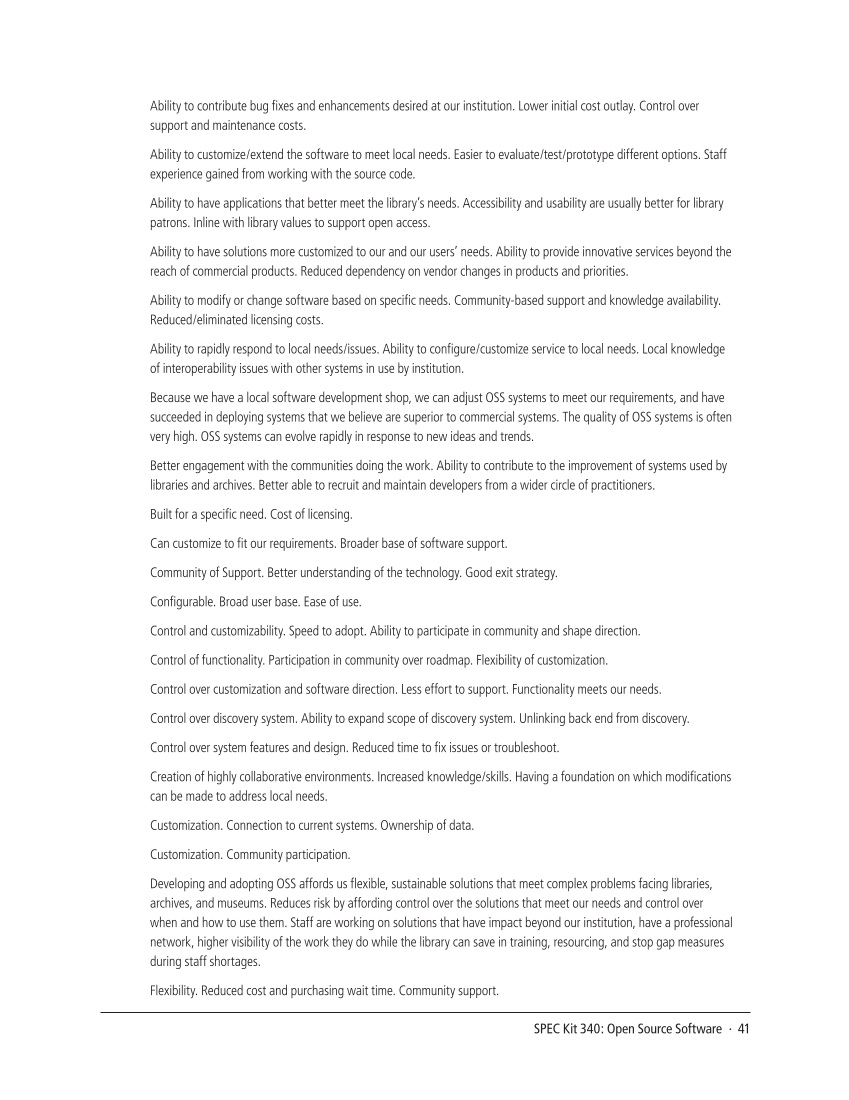SPEC Kit 340: Open Source Software · 41
Ability to contribute bug fixes and enhancements desired at our institution. Lower initial cost outlay. Control over
support and maintenance costs.
Ability to customize/extend the software to meet local needs. Easier to evaluate/test/prototype different options. Staff
experience gained from working with the source code.
Ability to have applications that better meet the library’s needs. Accessibility and usability are usually better for library
patrons. Inline with library values to support open access.
Ability to have solutions more customized to our and our users’ needs. Ability to provide innovative services beyond the
reach of commercial products. Reduced dependency on vendor changes in products and priorities.
Ability to modify or change software based on specific needs. Community-based support and knowledge availability.
Reduced/eliminated licensing costs.
Ability to rapidly respond to local needs/issues. Ability to configure/customize service to local needs. Local knowledge
of interoperability issues with other systems in use by institution.
Because we have a local software development shop, we can adjust OSS systems to meet our requirements, and have
succeeded in deploying systems that we believe are superior to commercial systems. The quality of OSS systems is often
very high. OSS systems can evolve rapidly in response to new ideas and trends.
Better engagement with the communities doing the work. Ability to contribute to the improvement of systems used by
libraries and archives. Better able to recruit and maintain developers from a wider circle of practitioners.
Built for a specific need. Cost of licensing.
Can customize to fit our requirements. Broader base of software support.
Community of Support. Better understanding of the technology. Good exit strategy.
Configurable. Broad user base. Ease of use.
Control and customizability. Speed to adopt. Ability to participate in community and shape direction.
Control of functionality. Participation in community over roadmap. Flexibility of customization.
Control over customization and software direction. Less effort to support. Functionality meets our needs.
Control over discovery system. Ability to expand scope of discovery system. Unlinking back end from discovery.
Control over system features and design. Reduced time to fix issues or troubleshoot.
Creation of highly collaborative environments. Increased knowledge/skills. Having a foundation on which modifications
can be made to address local needs.
Customization. Connection to current systems. Ownership of data.
Customization. Community participation.
Developing and adopting OSS affords us flexible, sustainable solutions that meet complex problems facing libraries,
archives, and museums. Reduces risk by affording control over the solutions that meet our needs and control over
when and how to use them. Staff are working on solutions that have impact beyond our institution, have a professional
network, higher visibility of the work they do while the library can save in training, resourcing, and stop gap measures
during staff shortages.
Flexibility. Reduced cost and purchasing wait time. Community support.
Ability to contribute bug fixes and enhancements desired at our institution. Lower initial cost outlay. Control over
support and maintenance costs.
Ability to customize/extend the software to meet local needs. Easier to evaluate/test/prototype different options. Staff
experience gained from working with the source code.
Ability to have applications that better meet the library’s needs. Accessibility and usability are usually better for library
patrons. Inline with library values to support open access.
Ability to have solutions more customized to our and our users’ needs. Ability to provide innovative services beyond the
reach of commercial products. Reduced dependency on vendor changes in products and priorities.
Ability to modify or change software based on specific needs. Community-based support and knowledge availability.
Reduced/eliminated licensing costs.
Ability to rapidly respond to local needs/issues. Ability to configure/customize service to local needs. Local knowledge
of interoperability issues with other systems in use by institution.
Because we have a local software development shop, we can adjust OSS systems to meet our requirements, and have
succeeded in deploying systems that we believe are superior to commercial systems. The quality of OSS systems is often
very high. OSS systems can evolve rapidly in response to new ideas and trends.
Better engagement with the communities doing the work. Ability to contribute to the improvement of systems used by
libraries and archives. Better able to recruit and maintain developers from a wider circle of practitioners.
Built for a specific need. Cost of licensing.
Can customize to fit our requirements. Broader base of software support.
Community of Support. Better understanding of the technology. Good exit strategy.
Configurable. Broad user base. Ease of use.
Control and customizability. Speed to adopt. Ability to participate in community and shape direction.
Control of functionality. Participation in community over roadmap. Flexibility of customization.
Control over customization and software direction. Less effort to support. Functionality meets our needs.
Control over discovery system. Ability to expand scope of discovery system. Unlinking back end from discovery.
Control over system features and design. Reduced time to fix issues or troubleshoot.
Creation of highly collaborative environments. Increased knowledge/skills. Having a foundation on which modifications
can be made to address local needs.
Customization. Connection to current systems. Ownership of data.
Customization. Community participation.
Developing and adopting OSS affords us flexible, sustainable solutions that meet complex problems facing libraries,
archives, and museums. Reduces risk by affording control over the solutions that meet our needs and control over
when and how to use them. Staff are working on solutions that have impact beyond our institution, have a professional
network, higher visibility of the work they do while the library can save in training, resourcing, and stop gap measures
during staff shortages.
Flexibility. Reduced cost and purchasing wait time. Community support.
























































































































































































